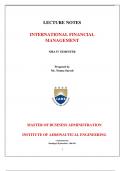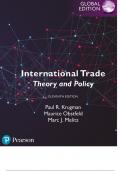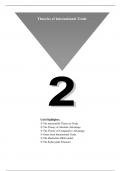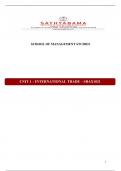Paulwathuo6
On this page, you find all documents, package deals, and flashcards offered by seller paulwathuo6.
- 17
- 0
- 0
Community
- Followers
- Following
17 items

Development Economics
Econometrics is the use of statistical methods to develop theories or test existing hypotheses in economics or finance. Econometrics relies on techniques such as regression models and null hypothesis testing. Econometrics can also be used to try to forecast future economic or financial trends. As with other statistical tools, econometricians should be careful not to infer a causal relationship from statistical correlation. Some economists have criticized the field of econometrics for priorit...
- Class notes
- • 187 pages •
Econometrics is the use of statistical methods to develop theories or test existing hypotheses in economics or finance. Econometrics relies on techniques such as regression models and null hypothesis testing. Econometrics can also be used to try to forecast future economic or financial trends. As with other statistical tools, econometricians should be careful not to infer a causal relationship from statistical correlation. Some economists have criticized the field of econometrics for priorit...

Development Economics
Econometrics is the use of statistical methods to develop theories or test existing hypotheses in economics or finance. Econometrics relies on techniques such as regression models and null hypothesis testing. Econometrics can also be used to try to forecast future economic or financial trends. As with other statistical tools, econometricians should be careful not to infer a causal relationship from statistical correlation. Some economists have criticized the field of econometrics for priorit...
- Class notes
- • 790 pages •
Econometrics is the use of statistical methods to develop theories or test existing hypotheses in economics or finance. Econometrics relies on techniques such as regression models and null hypothesis testing. Econometrics can also be used to try to forecast future economic or financial trends. As with other statistical tools, econometricians should be careful not to infer a causal relationship from statistical correlation. Some economists have criticized the field of econometrics for priorit...

Development Economics
Econometrics is the use of statistical methods to develop theories or test existing hypotheses in economics or finance. Econometrics relies on techniques such as regression models and null hypothesis testing. Econometrics can also be used to try to forecast future economic or financial trends. As with other statistical tools, econometricians should be careful not to infer a causal relationship from statistical correlation. Some economists have criticized the field of econometrics for priorit...
- Class notes
- • 910 pages •
Econometrics is the use of statistical methods to develop theories or test existing hypotheses in economics or finance. Econometrics relies on techniques such as regression models and null hypothesis testing. Econometrics can also be used to try to forecast future economic or financial trends. As with other statistical tools, econometricians should be careful not to infer a causal relationship from statistical correlation. Some economists have criticized the field of econometrics for priorit...

Class notes Development Economics
International finance is the study of monetary interactions that transpire between two or more countries. International finance focuses on areas such as foreign direct investment and currency exchange rates. Increased globalization has magnified the importance of international finance. An initiative known as the Bretton Woods system emerged from a 1944 conference attended by 40 nations and aims to standardize international monetary exchanges and policies in a broader effort to nurture post Wo...
- Class notes
- • 606 pages •
International finance is the study of monetary interactions that transpire between two or more countries. International finance focuses on areas such as foreign direct investment and currency exchange rates. Increased globalization has magnified the importance of international finance. An initiative known as the Bretton Woods system emerged from a 1944 conference attended by 40 nations and aims to standardize international monetary exchanges and policies in a broader effort to nurture post Wo...

Class notes Development Economics
International finance is the study of monetary interactions that transpire between two or more countries. International finance focuses on areas such as foreign direct investment and currency exchange rates. Increased globalization has magnified the importance of international finance. An initiative known as the Bretton Woods system emerged from a 1944 conference attended by 40 nations and aims to standardize international monetary exchanges and policies in a broader effort to nurture post Wo...
- Class notes
- • 90 pages •
International finance is the study of monetary interactions that transpire between two or more countries. International finance focuses on areas such as foreign direct investment and currency exchange rates. Increased globalization has magnified the importance of international finance. An initiative known as the Bretton Woods system emerged from a 1944 conference attended by 40 nations and aims to standardize international monetary exchanges and policies in a broader effort to nurture post Wo...

Development Economics
International trade is the purchase and sale of goods and services by companies in different countries. Consumer goods, raw materials, food, and machinery all are bought and sold in the international marketplace. International trade allows countries to expand their markets and access goods and services that otherwise may not have been available domestically. As a result of international trade, the market is more competitive. This ultimately results in more competitive pricing and brings a che...
- Class notes
- • 367 pages •
International trade is the purchase and sale of goods and services by companies in different countries. Consumer goods, raw materials, food, and machinery all are bought and sold in the international marketplace. International trade allows countries to expand their markets and access goods and services that otherwise may not have been available domestically. As a result of international trade, the market is more competitive. This ultimately results in more competitive pricing and brings a che...

Development Economics
Trading globally gives consumers and countries the opportunity to be exposed to goods and services not available in their own countries, or more expensive domestically. The importance of international trade was recognized early on by political economists such as Adam Smith and David Ricardo. Still, some argue that international trade can actually be bad for smaller nations, putting them at a greater disadvantage on the world stage.
- Class notes
- • 29 pages •
Trading globally gives consumers and countries the opportunity to be exposed to goods and services not available in their own countries, or more expensive domestically. The importance of international trade was recognized early on by political economists such as Adam Smith and David Ricardo. Still, some argue that international trade can actually be bad for smaller nations, putting them at a greater disadvantage on the world stage.

Development Economics
Trading globally gives consumers and countries the opportunity to be exposed to goods and services not available in their own countries, or more expensive domestically. The importance of international trade was recognized early on by political economists such as Adam Smith and David Ricardo. Still, some argue that international trade can actually be bad for smaller nations, putting them at a greater disadvantage on the world stage.
- Class notes
- • 4 pages •
Trading globally gives consumers and countries the opportunity to be exposed to goods and services not available in their own countries, or more expensive domestically. The importance of international trade was recognized early on by political economists such as Adam Smith and David Ricardo. Still, some argue that international trade can actually be bad for smaller nations, putting them at a greater disadvantage on the world stage.

Development Economics
International trade allows countries to expand their markets and access goods and services that otherwise may not have been available domestically. As a result of international trade, the market is more competitive. This ultimately results in more competitive pricing and brings a cheaper product home to the consumer.
- Class notes
- • 210 pages •
International trade allows countries to expand their markets and access goods and services that otherwise may not have been available domestically. As a result of international trade, the market is more competitive. This ultimately results in more competitive pricing and brings a cheaper product home to the consumer.

Development Economics
International trade allows countries to expand their markets and access goods and services that otherwise may not have been available domestically. As a result of international trade, the market is more competitive. This ultimately results in more competitive pricing and brings a cheaper product home to the consumer.
- Class notes
- • 99 pages •
International trade allows countries to expand their markets and access goods and services that otherwise may not have been available domestically. As a result of international trade, the market is more competitive. This ultimately results in more competitive pricing and brings a cheaper product home to the consumer.
